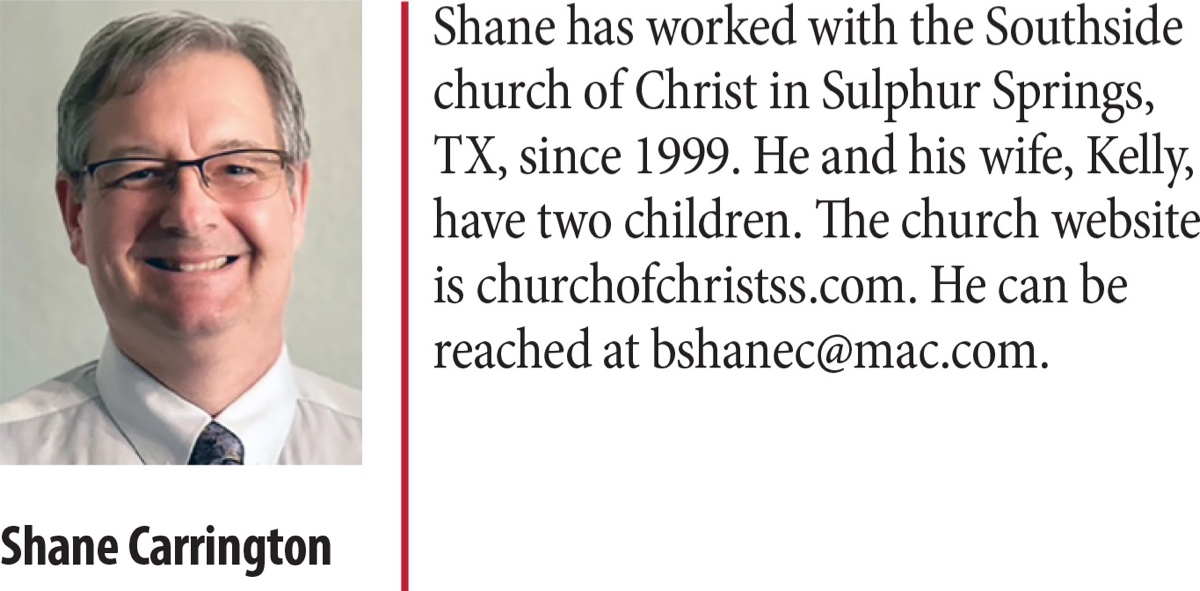By Shane Carrington
Synopsis: Trust what the Holy Spirit reveals in Scripture, not what you feel, and you will pray in faith.
Prayer is one of God’s greatest gifts! Like a small child speaking to a loving parent, praying to God holds such importance that the Holy Spirit inspired many statements emphasizing prayer’s vital role in the lives of disciples (1 Tim. 2:1; 1 Thess. 5:16-18; Luke 18:1; Phil. 4:6-7; Col. 4:2; Rom. 12:12, etc.).
As Paul concludes discussing the armor of God in Ephesians 6:18, he said, “With all prayer and petition, pray at all times in the Spirit, and with this in view, be on the alert with all perseverance and petition for all the saints. . .” What does the apostle intend by the command, “pray. . . in the Spirit?”
Pray in tongues?
Pray expecting to feel bodily sensations of Him moving?
Pray for mystical guidance outside the written word?
Pray expecting a visible sign that He is answering you?
Or pray in harmony with God’s purposes for prayer as revealed by the Holy Spirit in Scripture?
What role does the Holy Spirit possess in our prayers? Let us answer this vital question by relying upon the teachings of Scripture.
The connection between the Holy Spirit and the word He revealed permeates the letter to the Ephesians (Eph. 3:2-5; 6:17, etc.).
As Paul describes “the full armor of God” (Eph. 6:10-20), every piece of the panoply is a synonym for the gospel of Jesus Christ, or it is so closely connected to the word that you cannot separate them.
“having girded your loins with truth” (v. 14)—God’s word (John 17:17)
“having put on the breastplate of righteousness” (v. 14)—comes from God’s word (Rom. 1:16-17)
“having shod your feet with the preparation of the gospel of peace” (v. 15)—God’s word
“taking up the shield of faith” (v. 16)—comes from God’s word (Rom. 10:17)
“the helmet of salvation” (v. 17)—comes from God’s word (Mark 16:15-20; Rom. 1:16-17)
“and the sword of the Spirit, which is the word of God” (v. 17)—God’s word
Immediately after this, Paul writes, “With all prayer and petition, pray at all times in the Spirit. . .” (Eph. 6:18). Two points need to be emphasized (1) The sword with which the Spirit changes hearts and lives is “the word of God,” so “praying at all times in the Spirit” means to pray according to what the Spirit has revealed in the word. Since all other pieces of the armor reference God’s word, this means to pray in harmony with what the Holy Spirit has revealed in the word concerning prayer. This differs greatly from what we sometimes hear today.
A biblically deficient view of the Holy Spirit will not grow disciples closer to God. While miraculous gifts of the Spirit were instrumental in God revealing and verifying His word, some today are looking for sensational outpourings of the Spirit without even understanding why those miracles occurred.
Famous author, Max Lucado, now claims to pray in tongues (cf. article by Jessica Lea, cited below). His newest book, Help Is Here: Finding Fresh Strength and Purpose in the Power of the Holy Spirit, Lucado claims that the supernatural power of the Holy Spirit in first-century disciples is available in some measure to modern disciples, a belief which we showed unbiblical in a recent article.
Another modern preacher claims he has recently seen the walls and floors of the church building shake and groan during prayer and studies with others.
Greg Laurie, a well known denominational preacher, said, “Revival is a work of the Holy Spirit; it’s not something we can make happen. Revival is God’s responsibility. It’s what God does for us” (Pope-Levison, 140). This sentiment is common in Calvinist and neo-Calvinist circles. While all blessings come from God (Jas. 1:17), many of those blessings are realized only when we trust and obey Jesus (Matt. 7:21-29).
In the examples above, feelings take center stage, and every positive emotion is attributed to a mystical, direct indwelling of the Holy Spirit. An absence of these emotions supposedly shows God’s absence in our lives. When such individuals feel emotionally moved in prayer, they claim the Holy Spirit is giving them spiritual power.
In contrast, how did Jesus feel while praying in the garden?
. . .He knelt down and began to pray, saying, “Father, if You are willing, remove this cup from Me; yet not My will, but Yours be done.” . . .And being in agony He was praying very fervently; and His sweat became like drops of blood, falling down upon the ground (Luke 22:41-44).
Matthew reports that Jesus prayed this same prayer three times (Matt. 26:44). Was our Lord having a positive emotional experience? If not, was the Spirit not present with Him at this point? Did His feelings betray God’s absence?
Emotions indicate neither God’s presence nor absence. Jesus, and many other biblical examples, show this. It is dangerous to decide that God is with us or not, depending on whether we “feel” His presence. God declares His presence with His people through the pages of His word (Matt. 28:18-20; Heb. 13:5-6). Trust what God says in Scripture and do what He wills. Then His promise to be with you will become a reality, whether your emotional experience is one of elation or great suffering. Leaning on emotions is carnality (Gal. 5:16-21); “walking by faith” is true spirituality (2 Cor. 5:1-10). Follow what God says (Prov. 1:1-7; 3:5-6), not what you feel (Jer. 10:23; Isa. 55:8-9; Prov. 14:12), and you will serve Him by faith (Rom. 10:17; Gal. 5:19-25).
This is another passage concerning “the Spirit” and prayer. Some quickly accept this as referring to the role of the person called the Holy Spirit in our prayers. While that may be Paul’s point (as most commentators agree), there are perhaps other possibilities in the text.
The word “Spirit” is used in three related ways in Romans 8.
The divine person called “the Holy Spirit” (Rom. 8:9-11).
The word/law revealed by the Spirit (Rom. 8:2; cf. John 16:7-15; 17:17; Eph. 3:3-5).
The attitude/mindset produced in hearts that are attuned to the inspired message revealed by the Holy Spirit (Rom. 8:5-8, 15; cf. Eph. 6:17; Heb. 4:12).
Which of these three uses does the context demand in Romans 8:26-27? While most agree it is the person of the Holy Spirit, some voices dissent. Elmer Moore, Robert F. Turner, and R. L. Whiteside all concur that “the Spirit” in these verses refers to spiritually-minded disciples praying without always knowing exactly what to say (Moore, 134-136; Turner, 68-69; Whiteside, 135-137). God “searches the hearts” of those who pray, and He knows what they mean. These three also agree that the Holy Spirit, through Scripture, teaches us what we need to know about prayer. How incredibly comforting! In truth, we cannot be spiritually minded without listening to the word which the Holy Spirit revealed.
Whatever conclusion one draws about “the Spirit” in Romans 8:26-27, neither position would show what the Spirit does to us, but for us. The point of this passage remains the same: when you pray, God understands what you intend, even when you don’t know what to say. What a difference it makes when we know God loves us, hears us, and patiently considers our petitions as we pour out our hearts to Him!
Prayer is one of God’s greatest gifts. The Father designed prayer. Jesus died and arose to give us access to God in prayer. The Holy Spirit revealed the truth about prayer (Eph. 6:17-18), including our assurance as we pray to God in faith (Rom. 8:26-27). Therefore, let us “pray. . . in the Holy Spirit” by praying biblically, earnestly, unselfishly, humbly, and lovingly. Trust God when you pray; He will hear you and answer according to His will.
Lea, Jessica. “Speaking in Tongues Is Now Part of Max Lucado’s Regular Prayer Time.” Church Leaders, September 12, 2022. https://churchleaders.com/news/433857-speaking-in-tongues-max-lucado-prayer-time.html.
Lucado, Max. Help Is Here: Finding Fresh Strength and Purpose in the Power of the Holy Spirit. Nashville, TN: Harper, 2022.
Moore, Elmer. Lessons on the Holy Spirit. Bowling Green, KY: Truth Books, 2010.
Pope-Levison, Pricilla. Models of Evangelism. Grand Rapids, MI: Baker Academic, 2020.
Turner, Robert F. Reading Romans. Temple Terrace, FL: Florida College Bookstore, 1995.
Whiteside, R. L. A New Commentary on Paul’s Letter to the Saints at Rome. Bowling Green, KY: Guardian of Truth Foundation, 1988.


